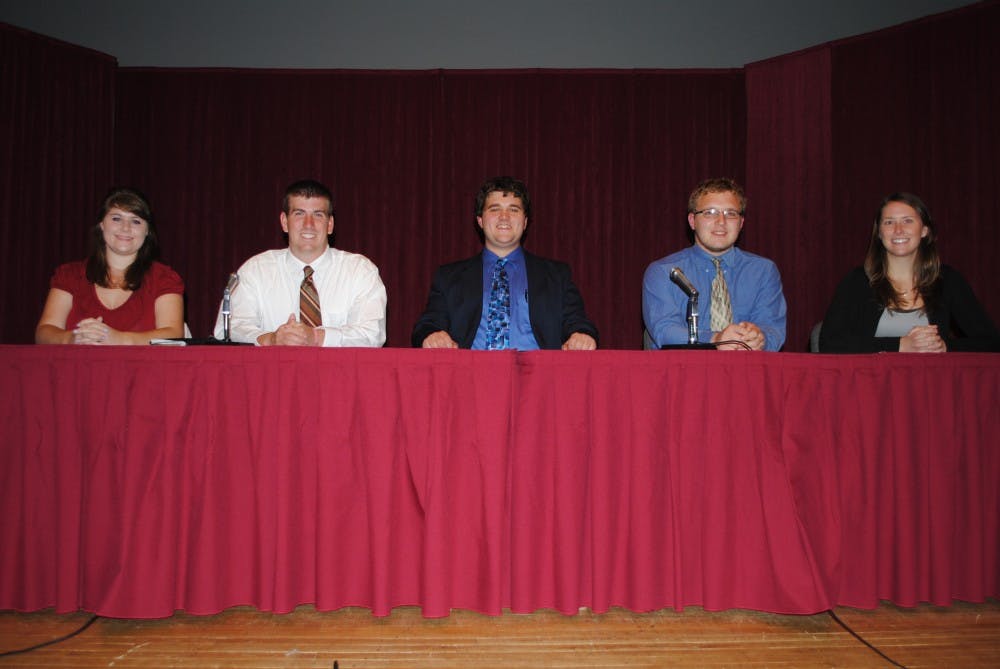In the spirit of election season, the Shippensburg University History Club organized a roaring debate on Monday night in Old Main Chapel. The topic of the debate was the environment and society. History Club President Mark Shifflet led the debate alongside other office members, Vice President Andrew Welles, Treasurer Chris Pavone, Secretary Allison Warner and Historian Tara Shehan.
There are a lot of issues that arise in the presidential election from economy to foreign policy. Something that often gets overlooked is the environment and what effects it has on society. Most people might not know what “fracking” is, and neither did most in attendance, but fracking is an issue that affects so many people. Looking up the definition to get a better idea, fracking, or hydraulic fracturing, is actually the process of mining to release petroleum, natural gas and other substances for extraction. Essentially, it is the drilling of rock formations to find necessary energy sources. This hot button issue arises because although it has offered many jobs for people, it is affecting the drinking water and air quality in these areas being fracked.
Most of the students present brought up the fact that it is good to use fracking now, but to only look at it in the short term. Until we can use solar and wind energy, the use of natural gas and petroleum for energy is sufficient. It is creating jobs, which seems to be important, but is that enough to commend this form of energy?
Mariah Mahlendorf, a student at the debate said, “Look at it in Detroit, their economy is crashed. Ohio has no jobs and bad drinking water. The economy is worse off even with these new jobs.”
As the debate shifted to coal, Shifflet asked if the environmental struggle for coal is beneficial to the jobs and the energy that we get from coal.
Another student, Erin Grady said, “It is horrible what coal does, but our society has many benefits from it. We become dependent regardless of what we do.”
This brings up the fact of are there other ways to combat the use of coal as an energy source?
The battle got heated as many students fought about the forms of energy like solar and wind compared to coal. Welles brought up the point of what we would do when coal was gone in which many students reacted quickly.
“Solar energy would help create more jobs, especially in big cities,” Mahlendorf said.
Grady contested, “What will we do on overcast days when we cannot get direct sunlight?”
Glusco brought up another great point when he said brought up the amount of oil it takes to create a solar panel. Why should we spend the money and the resources just to make solar panels?
The debate finally shifted to oil and what is the best route to go with oil until we can find an alternate. Most students claimed it was a lifestyle decision most people would not move away from because we are so dependent on it. Transportation became a huge subtopic especially when SU student Christian Reed mentioned his thoughts.
Reed, who bikes to school said, “On the transportation issue, we could give people the option to ride bikes. If we invested in bike lanes it would cut down on gas.”
Reed used other countries’ examples to back his point. Reed also introduced a change to the constitution to suit the needs for today. Glusco preached that a tax increase on things would bring a shift to other uses of energy, but where will we ever find a politician to run a campaign on raising taxes and expect to win.
The debate was full of interesting facts and important issues. If you ever want to get involved with the History Club or learn more about these topics, contact President Mark Shifflet or the History/Philosophy Department’s secretary Janice Reed.



The Slate welcomes thoughtful discussion on all of our stories, but please keep comments civil and on-topic. Read our full guidelines here.